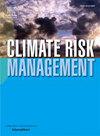气候风险热点地区气候变化适应与家庭财富的关系——来自巴基斯坦农村农户的见解
IF 5
2区 环境科学与生态学
Q1 ENVIRONMENTAL SCIENCES
引用次数: 0
摘要
农业部门是经济发展的基石,特别是在小农农业支持生计和粮食安全的低收入国家。然而,气候因素日益增加的不可预测性构成了重大挑战,威胁到其通过粮食生产增加小农家庭财富的能力。虽然气候适应措施已得到广泛推广,但仍明显缺乏建立气候适应与家庭财富之间关系的经验证据。为了弥补这一重要的研究缺口,本研究调查了巴基斯坦信德省400名小麦小农的气候适应与家庭财富之间的关系。利用内源性转换回归(ESR)和倾向评分匹配(PSM)的稳健性,我们估计了对被治疗者(ATT)的平均治疗效果。结果一致表明,气候适应显著增加了人均家庭财富,主要是通过提高作物产量。反事实分析表明,如果采取适应措施,非收养家庭可以将贫困严重程度降低15%,将极端贫困程度降低17%。这些发现为政策制定者优先考虑适应支持框架(如补贴投入或培训计划)提供了令人信服的经验证据,这些框架对于保障粮食生产、降低气候脆弱性和帮助小农脱贫至关重要。通过展示适应的双重效益——积累财富和减轻贫困——本研究强调了扩大气候适应型农业实践作为减少脆弱性和促进可持续生计的关键战略的紧迫性。本文章由计算机程序翻译,如有差异,请以英文原文为准。

Nexus of climate change adaptation and household wealth in climate risk hotspots – Insights from rural farm households of Pakistan
The agricultural sector is a cornerstone of economic development, particularly in low-income countries where smallholder farming supports livelihoods and food security. However, the increasing unpredictability of climatic factors poses significant challenges, threatening its capacity to bolster smallholder farmers’ household wealth through food production. While climate adaptation measures have been widely promoted, there remains a notable lack of empirical evidence establishing the relationship between climate adaptation and household wealth. Addressing this critical research gap, this study examines the relationship between climate adaptation and household wealth among 400 wheat smallholder farmers in Sindh province, Pakistan. Using endogenous switching regression (ESR) and propensity score matching (PSM) for robustness, we estimate the average treatment effect on the treated (ATT). The results consistently show that climate adaptation significantly increases per capita household wealth, primarily through enhanced crop production. Counterfactual analysis reveals that non-adopting households could have reduced poverty severity by 15% and extreme poverty by 17% had they adopted adaptation measures. These findings provide compelling empirical evidence for policymakers to prioritize adaptation support frameworks—such as subsidized inputs or training programs—which are indispensable for safeguarding food production, reducing climate vulnerability, and lifting smallholders out of poverty. By demonstrating the dual benefits of adaptation—wealth accumulation and poverty alleviation—this study underscores the urgency of scaling up climate-resilient agricultural practices as a key strategy for reducing vulnerability and fostering sustainable livelihoods.
求助全文
通过发布文献求助,成功后即可免费获取论文全文。
去求助
来源期刊

Climate Risk Management
Earth and Planetary Sciences-Atmospheric Science
CiteScore
8.20
自引率
4.50%
发文量
76
审稿时长
30 weeks
期刊介绍:
Climate Risk Management publishes original scientific contributions, state-of-the-art reviews and reports of practical experience on the use of knowledge and information regarding the consequences of climate variability and climate change in decision and policy making on climate change responses from the near- to long-term.
The concept of climate risk management refers to activities and methods that are used by individuals, organizations, and institutions to facilitate climate-resilient decision-making. Its objective is to promote sustainable development by maximizing the beneficial impacts of climate change responses and minimizing negative impacts across the full spectrum of geographies and sectors that are potentially affected by the changing climate.
 求助内容:
求助内容: 应助结果提醒方式:
应助结果提醒方式:


